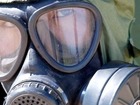Spotlight
British Prime Minister David Cameron said on Friday that growing evidence of the use of chemical weapons by the Syrian regime was "extremely serious".
He agreed with U.S. President Barack Obama that such use would represent a "red line" for the international community, but said the response would likely be political rather than military.
 Full Story
Full Story
The death toll from a three-day wave of violence in Iraq passed 190 after three hours of heavy fighting in Fallujah, west of Baghdad, police and a doctor said on Friday.
The clashes, which broke out at around 9:00 pm (18:00 GMT) on Thursday, saw gunmen take control of three checkpoints on the outskirts of the overwhelmingly Sunni Arab city after they were abandoned by federal police, police Lieutenant Colonel Yasir Hamid al-Jumaili said.
 Full Story
Full Story
Israeli security forces overnight demolished two structures that Jewish settlers had erected to create a "wildcat" outpost in the occupied West Bank, a police spokesman said on Friday.
Soldiers and border policemen razed the makeshift structures of the Oz Zion outpost near the central city of Ramallah without incident, Luba Samri told Agence France Presse.
 Full Story
Full Story
Fresh fighting erupted on the outskirts of Damascus on Friday, as Syrian regime troops battled rebels in the north, south and east, backed in some areas by tanks and militia, a watchdog said.
"Fierce clashes are raging in Barzeh district, pitting rebels against troops and members of the pro-regime popular committees," the Syrian Observatory for Human Rights said.
 Full Story
Full Story
U.N. leader Ban Ki-moon on Thursday renewed an "urgent call" for Syria to let inspectors into the country after the United States said government forces had probably used chemical weapons.
"The secretary general has consistently urged the Syrian authorities to provide full and unfettered access to the team. He renews this urgent call today," said U.N. spokesman Martin Nesirky.
 Full Story
Full Story
Jordan on Thursday called on the U.N. Security Council to declare the exodus of refugees from Syria a threat to international security and to organize a visit to the region.
Jordan fears that with more than 505,000 Syrian refugees now in the country it risks being overwhelmed and drawn into the crisis, diplomats said.
 Full Story
Full Story
Britain has "limited but persuasive" evidence of the use of chemical weapons in Syria, including sarin gas, the Foreign Office said on Thursday, following similar comments by U.S. officials.
"We have limited but persuasive information from various sources showing chemical weapon use in Syria, including sarin," a Foreign Office spokeswoman said.
 Full Story
Full Story
The White House said Thursday that Syria had likely used chemical weapons against rebel forces on a "small scale," but emphasized U.S. spy agencies were still not 100 percent sure of the assessment.
A senior U.S. administration official commented on the news, saying that "all options are on the table" if it is confirmed that Syria has used chemical weapons against opposition forces.
 Full Story
Full Story
Syria's regime has changed strategy and is battling to seize main highways rather than spread its forces thin, aiming to regain key points and freeze the flow of fighters and arms towards Damascus.
To help achieve this goal, the army is being backed by local militiamen operating in their own towns and villages and who have been trained in street warfare for several months in Iran and Russia, according to experts and sources close to Syria's security forces.
 Full Story
Full Story
Israel's prison service caused the death of an Australian-Israeli known as "Prisoner X" by failing to prevent him from committing suicide in jail, a court document released on Thursday said.
Prisoner X, who was identified by Australian media as Mossad agent Ben Zygier, was found hanged in his isolation cell in Ayalon prison near Tel Aviv in December 2010 -- in a case which Israel went to extreme lengths to cover up.
 Full Story
Full Story




